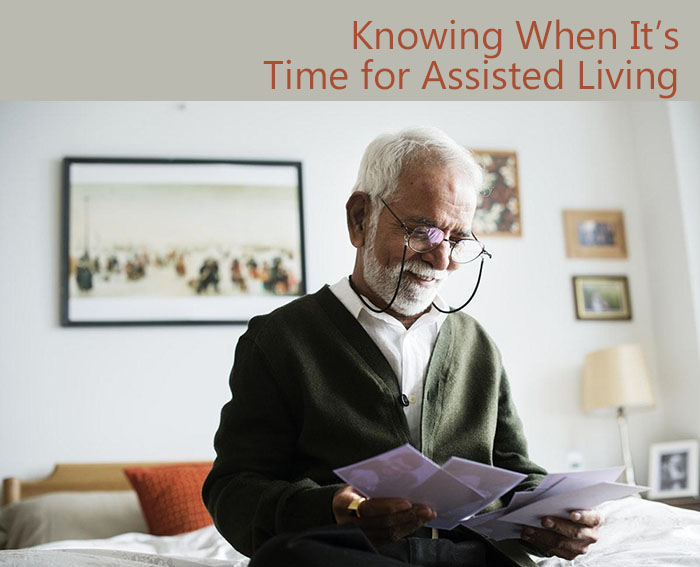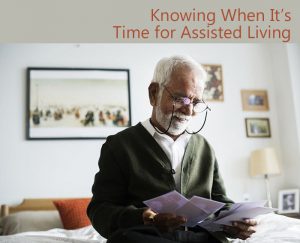Knowing When It’s Time for Assisted Living
by Lydia Chan | Co-Creator, Alzehimer’s Caregiver
It seems like just a few short years ago that your parents were young and spry, but lately, you can tell that age is catching up to them. Is it nothing to worry about, or is it a sign that your parents need more help than they’re getting at home? If you’re wondering if now is the right time for assisted living, here’s what you need to know.
What Assisted Living Offers
Many people associate assisted living with nursing homes, but these two long-term care options are very different. Nursing homes are designed for people who need around-the-clock care, including medical supervision. Assisted living, on the other hand, caters to seniors who need personalized support and a safe living environment, but don’t require ongoing medical care. In assisted living, seniors can expect private or shared apartments, lively common areas, and services such as:
- Assistance with daily living activities.
- Emergency call systems.
- Health and wellness programs.
- Social, recreational, and religious activities.
While services and amenities are important, so is your loved ones’ comfort. Include your parents in the selection process by touring facilities together and empowering them to make the final decision. To keep the process manageable, research online first to narrow the options to a few communities that fit your parents’ budget and care needs. With 55 facilities in Seattle to consider, you all should easily be able to settle on the right assisted living community.
5 Signs It’s Time for Assisted Living
Frequent injuries
An injury doesn’t have to lead to hospitalization in order to be cause for concern. When a senior starts showing up with unexplained bumps and bruises, take notice. It may be a sign they’re having difficulty getting around the house, in which case it’s better to get them into assisted living before those bumps and bruises escalate to more serious injuries.
Medication mistakes
Failing to take medications as prescribed can be dangerous and lead to a significant decline in health among elderly patients. Poor cognition and memory both contribute to medication errors among older adults. If tools like pill organizers, timers, and medication apps don’t solve the problem, a senior may need to move to assisted living where their medication is supervised.
Cognitive changes
Missing medication or double-dosing can be a sign of growing cognitive impairment. While seniors with mild cognitive impairment can continue to live independently, a senior who is struggling to accomplish everyday tasks like shopping for groceries, handling money, and dressing needs the help that assisted living provides.
Unexplained weight loss
Unexplained weight loss is a sign that your senior loved one isn’t getting the nutrition they need at home. Poor dietary habits puts seniors at risk of malnutrition. It can also be a sign of other health problems like depression, gastrointestinal disease, or cancer. Whether a senior’s weight loss is due to illness or lack of motivation, assisted living offers the nutritional support they need.
Poor hygiene
If your tidy parents are suddenly unkempt, it could be a sign of growing physical or mental health problems. A cluttered home also presents a safety risk. Seniors with mobility problems, vision loss, or who wake up to use the toilet during the night are at risk of tripping over loose cords, scatter rugs, and other clutter.
How to Broach the Assisted Living Conversation
Odds are, your parents aren’t looking forward to assisted living. So how can you convince them it’s the right move? Rather than immediately suggesting assisted living, ask your parents about the challenges they’re facing at home and discuss solutions. It’s possible that assisted living isn’t the only option. Some seniors manage with home care and a downsized home. However, if it’s clear that assisted living is the best solution to your parents’ problems, listen honestly to their concerns and include them in the decision-making process.
With luck, these measures will help your parents feel understood and in charge of their move. If your parents are having trouble accepting the transition or you need advice on broaching the assisted living conversation, reach out to a counselor. Whether it’s a one-on-one session or family counseling, a counselor can help your family communicate better and navigate this life change with confidence.
Image via Rawpixel
ABOUT THE AUTHOR
Lydia Chan understands the life of caregiving for another. After her mom was diagnosed with Alzheimer’s and she found herself struggling to balance the responsibilities of caregiving and her own life.She is the co-creator of Alzheimer’s Caregiver, a website that aims to provide tips and resources to help caregivers.



